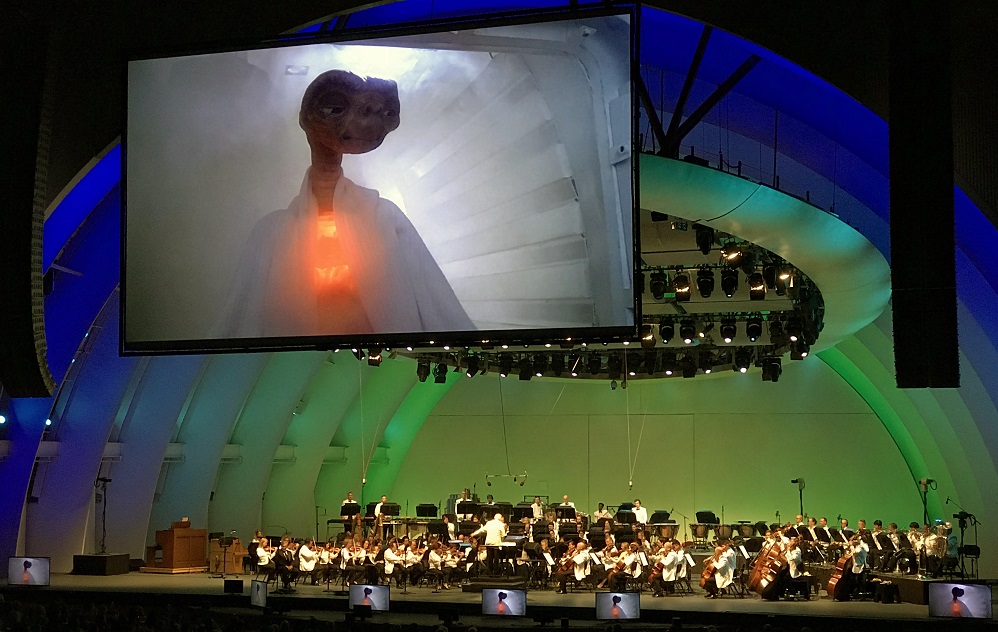From ‘E.T.’ to ‘Star Wars’ and Beyond, John Williams Celebrated at Hollywood Bowl
By Jon Burlingame
LOS ANGELES (Variety.com) – “I can direct bicycles to fly, but music truly makes them airborne,” Steven Spielberg told the 17,000-plus in attendance at the Hollywood Bowl on Sunday night. The revered director was on hand to applaud composer John Williams on his 40th anniversary of conducting the Los Angeles Philharmonic, the last of three Labor Day concerts to take place at the venerable venue. The two have collaborated for 45 years, during which Williams has won five Academy Awards.
Introducing Williams as maestro to the entire 15-minute finale of “E.T., the Extra-Terrestrial” live to picture, Spielberg noted: “John’s music directs all the traffic of our emotions. So when a staggering performance fills our eyes with tears, the appropriate score can make them fall. That’s what fills us with wonder… and that’s where E.T. got his soul.”
The end-of-summer concerts are now a tradition at the Bowl and routinely sell out in what’s acquired the reputation of a big party. It’s no wonder: with thousands of plastic light sabers ($10 each at the Bowl souvenir stand) waving in rhythm to whatever “Star Wars” selection the composer chooses to play, a good time is guaranteed.
This year, with nearly all of the program’s film-music selections originating in Spielberg films, the “Star Wars” themes were relegated to the encores. But, unlike other Bowl concerts where audiences invariably depart early, nobody left. Sunday night’s crowd cheered and red, blue and green light sabers illuminated the darkness as Williams played “The Rebellion Is Reborn” from 2017’s “The Last Jedi,” the original “Star Wars” theme, and the “Imperial March” from “The Empire Strikes Back.”
Earlier, Spielberg introduced four other pieces from their 28 films together: a stirring Americana theme from “Lincoln” that underscored scenes of his 1865 inaugural address; William’s Oscar-winning theme from “Schindler’s List” (“one of the most stunningly evocative gifts that John has ever given us,” Spielberg said); the dueling scene from “The Adventures of Tintin,” set against a fun montage of scenes of swordplay from dozens of pirate movies over the years; and the circus-train chase from the opening of “Indiana Jones and the Last Crusade.”
The latter was Spielberg’s film-scoring lesson, first screening the six-minute scene without music (“it will probably seem a lot longer than any of you remember”) and then with the Philharmonic playing the composer’s lighthearted but intricately detailed music in perfect sync with the action (“turning a flat, dry sea of mine into something a lot better than it ever could be without John’s gifts”).
David Newman conducted the first half of the concert, opening with Williams’ “Olympic Fanfare and Theme,” written for the 1984 Summer Olympics, which were held in Los Angeles. The composer has written many fanfares over his long career, but this may be his best, and with the addition of the 14 U.S. Army Herald Trumpets blasting away at the front of the stage, it has never sounded better. (Maybe every Williams concert should start with this.)
Newman (whose father Alfred Newman often hired Williams to play piano at 20th Century-Fox) has long championed film music in the concert hall and is now busily engaged in conducting it around the world. He credited Williams for making it possible by regularly programming film music (then “looked down upon by the musicians and the arts community at large,” Newman reminded the audience) during his 13-year tenure as music director with the Boston Pops Orchestra. “So John, from all of us to you, thank you, thank you, thank you,” Newman said.
Newman also conducted music from “Minority Report,” and two sequences featuring film: the six-minute cave scene from opening of “Raiders of the Lost Ark” and Williams’ “Flight to Neverland” from “Hook,” set to various flying scenes from throughout film history (including Williams’ own “Superman,” “Empire of the Sun,” “Harry Potter,” “1941” and “E.T.”).
Leonard Bernstein pieces in the program — the composer’s centennial is being celebrated this year — included the overture from “West Side Story”; a powerful suite from his only film score, “On the Waterfront”; and one written specifically for the concert hall: Williams’ lively, virtuosic 1988 birthday tribute (adapting tunes from “On the Town” and “West Side Story”) “To Lenny! To Lenny!”
Williams also addressed the audience briefly, telling the story of his first experience playing piano at the Bowl in 1958-59 (“Sixty years ago, I was 12 years old,” cracked the 86-year-old to laughter from the crowd) and how one-time Philharmonic executive director Ernest Fleischmann talked him into conducting at the Bowl in 1978. Said Williams: “This was enough of a scary invitation, and a flattering one, that I accepted, to my lasting joy and pleasure.”

